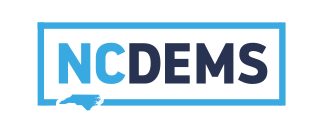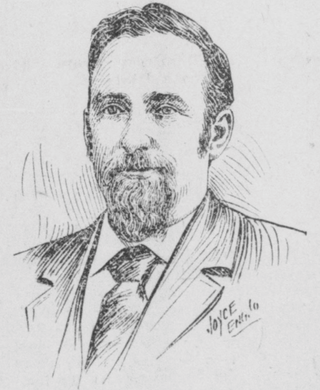
Clyde Roark Hoey was an American Democratic politician from North Carolina. He served in both houses of the state legislature and served briefly in the U.S. House of Representatives from 1919 to 1921. He was North Carolina's governor from 1937 to 1941. He entered the U.S. Senate in 1945 and served there until his death in 1954, only days before the Brown v. Board of Education decision. He was a segregationist.

Cameron A. Morrison was an American politician and the 55th governor of the U.S. state of North Carolina from 1921 to 1925.

The 1968 United States Senate elections were elections for the United States Senate. Held on November 5, the 34 seats of Class 3 were contested in regular elections. They coincided with the presidential election of the same year. The Republicans picked up five net seats in the Senate. This saw Republicans win a Senate seat in Florida for the first time since Reconstruction.

The 1954 United States Senate elections was a midterm election in the first term of Dwight D. Eisenhower's presidency. The 32 Senate seats of Class 2 were contested in regular elections, and six special elections were held to fill vacancies. Eisenhower's Republican party lost a net of two seats to the Democratic opposition. This small change was just enough to give Democrats control of the chamber with the support of an Independent who caucused with them.

The North Carolina Democratic Party (NCDP) is the North Carolina affiliate of the Democratic Party. It is headquartered in the historic Goodwin House, located in Raleigh.

Elections were held on November 2, 2010 to determine North Carolina's 13 members of the United States House of Representatives. Representatives were elected for two-year-terms to serve in the 112th United States Congress from January 3, 2011 until January 3, 2013. Primary elections were held on May 4, 2010 and primary runoff elections were held on June 22, 2010.

The 2012 North Carolina gubernatorial election took place on November 6, 2012, concurrently with the 2012 United States presidential election, U.S. House election, statewide judicial election, Council of State election and various local elections.

The 2018 United States House of Representatives elections in North Carolina were held on November 6, 2018, electing the thirteen U.S. representatives from the State of North Carolina, one from each of the state's congressional districts. The elections coincided with other elections to the House of Representatives, as well as elections to the United States Senate and various state and local elections.

The 1944 United States Senate election in North Carolina was held on November 7, 1944. Incumbent Democratic Senator Robert Rice Reynolds did not run for a third term in office. Former Governor of North Carolina Clyde R. Hoey won the open seat, defeating U.S. Representative Cameron A. Morrison in the Democratic primary and Republican attorney A.I. Ferree in the general election.

The 1950 United States Senate election in North Carolina was held on November 7, 1950. Incumbent Democratic Senator Clyde R. Hoey was re-elected to a second term in office over Republican Halsey B. Leavitt.

The 2020 United States House of Representatives elections in North Carolina were held on November 3, 2020, to elect the 13 U.S. representatives from the state of North Carolina, one from each of the state's 13 congressional districts. The elections coincided with the 2020 U.S. presidential election, as well as other elections to the House of Representatives, elections to the United States Senate and various state and local elections.

The North Carolina Council of State elections of 2020 were held on November 3, 2020, to select the ten officers of the North Carolina Council of State. These elections coincided with the presidential election, elections to the House of Representatives, elections to the Senate and elections to the North Carolina General Assembly and top state courts. Primary elections were held on March 3, 2020, for offices for which more than one candidate filed per party.

The 1944 North Carolina gubernatorial election was held on November 7, 1944. Democratic nominee R. Gregg Cherry defeated Republican nominee Frank C. Patton with 69.61% of the vote.

The 1940 North Carolina gubernatorial election was held on November 5, 1940. Democratic nominee J. Melville Broughton defeated Republican nominee Robert H. McNeill with 75.70% of the vote.

The 1932 North Carolina gubernatorial election was held on November 8, 1932. Democratic nominee John C. B. Ehringhaus defeated Republican nominee Clifford C. Frazier with 70.07% of the vote. At the time, Ehringhaus was an attorney and former state legislator; Frazier was an attorney, based in Greensboro.

The 1896 North Carolina gubernatorial election was held on November 3, 1896. Republican nominee Daniel Lindsay Russell defeated Democratic nominee Cyrus B. Watson with 46.52% of the vote. This was the only election in North Carolina between 1872 and 1972 in which the Republican nominee won the governor's office, and the only one until 2016 in which no candidate received over 50% of the vote.

The 1888 North Carolina gubernatorial election was held on November 6, 1888. Democratic nominee Daniel Gould Fowle defeated Republican nominee Oliver H. Dockery with 51.97% of the vote.

The 1884 North Carolina gubernatorial election was held on November 4, 1884. Democratic nominee Alfred Moore Scales defeated Republican nominee Tyre York with 53.80% of the vote.

Elections were held in Illinois on Tuesday, November 3, 1936.

The 1960 North Carolina lieutenant gubernatorial election was held on November 8, 1960. Democratic nominee Harvey Cloyd Philpott defeated Republican nominee S. Clyde Eggers with 58.98% of the vote.













